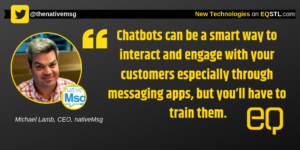
Text Messages Are Getting A Major Upgrade
With RCS, those futuristic cyberpunk dreams of bite-size AIs and a persistent mobile web become evenly distributed.
Just shy of a year ago, nativeMsg, a conversational AI startup co-founded out of St. Louis and Chicago, was selected to work with Google in their Early Access Program (EAP) for RCS business messaging. Next week, some of the formative insights and solutions developed in that program will be shared with the public.
Next week, on Wednesday 16th January at Innovation Hall in Cortex, Alex Allemand, Business Development Manager for RCS at Google, will be joining nativeMsg in a panel discussion hosted entitled See The Future of Messaging: RCS.
The initialism, RCS, stands for Rich Communication Services. What that means, put simply, is that text messages are going to get a massive upgrade.
Text messages, you say? Yep, upgrading text messages might seem anticlimactic. But it’s actually massive. The protocol for text messages has only been updated once before: from SMS to MMS.
SMS to MMS Created the Social Web
I’m sufficiently long in the tooth to remember when the upgrade from SMS to MMS was actually ‘a thing’ in 2003. Back in London, I joined a team of university friends who were building and beta testing a social network specifically around that technology phase shift.
The startup was called Moblog (i.e. a contraction of “Mobile Blog”) because that switch to MMS was the moment our mobiles stopped being just phones and suddenly became cameras too. Two years later, in 2005, Moblog was thrust into the media spotlight during a terrorist attack, when our social network received the first photo from subway passengers trapped underground, minutes after the London Bombings took place.
When those phones became cameras that could send pictures, Moblog was there to receive pictures, mostly of people’s pets and photos of their breakfast. What we didn’t anticipate was that cellphone photos and MMS would fundamentally change the news industry: citizen journalism would become the first draft of history.
The Social Web Created The Mobile Web
It’s no understatement to say that RCS could herald a similar global cultural shift, especially in regions affected by broadband connectivity issues that cause a “digital divide.” There has been plenty of coverage on how 4G networks have afforded The Third World to entirely skip an expensive generation of infrastructure development around broadband internet and desktop computing and jump straight into mobile.
RCS offers similar potential and its uses are only likely to expand with the adoption of 5G.
However, unlike MMS, many of the features we can expect to see in the early roll-out of RCS will resemble things we have seen before. The protocol upgrade to Rich Communication Services essentially mimics what most messaging apps, like Apple iMessage, Facebook Messenger, WhatsApp, Viber, and WeChat can do already.
But ‘Walled Gardens’ Introduced Digital Divisions
The key difference is that where chatbots, progressive web apps, and inter-app linking all currently only work inside of “walled gardens,” such as social networking platforms like Facebook or device ecosystems like iOS, RCS is actually a carrier upgrade. That means all of those types of features services can be delivered over the air (via a carrier like T-Mobile or Verizon), by anyone who wants to develop them.
Most pertinently perhaps, for any Android users who are envious of iMessage, RCS is basically the answer to that. With 85% of all smartphones running Android globally, it makes complete sense for Google to throw their weight behind facilitating business adoption of RCS.
The Mobile Web Hasn’t Worked For Everyone
In spite of their incredible reach and notwithstanding multiple solid attempts, until now, Google hasn’t got a stunning track record in launching apps that act like social networks. So, the company has not been able to drive adoption among Android users for a native messaging app that compares to iMessage on Apple iOS, nor give users a reason to no longer need Facebook Messenger.
Hangouts, Duo and Allo – Google’s previous entries in this competition – were shuttered last month in December 2018 and all of the features of those apps were rolled into the standard Android messages app. However, the sunsetting of these products seemed to be timed for the launch of RCS on Verizon, as a day later, the carrier announced RCS on the Google’s flagship Android phone, the Pixel 3.
RCS Fixes What Was Wrong with the Mobile Web
This time around, Google’s meta game around mobile social networking looks strong. Yet, more correctly, RCS is the mobile network’s answer to iMessage and Facebook. First launched by Sprint and T-Mobile, RCS allows all the major carriers to offer a completely new software ecosystem for businesses to reach consumers.
RCS offers businesses a range of important features we take for granted in existing messenger apps. Features like branded avatars, inter-app linking or suggested replies (which are commonly seen in chatbots) are probably the most exotic, but features like verified senders, read receipts and simply rich media promise to be game changing at scale, when they’ve broken through the physical distribution limits caused by software and device ecosystems.

A Fully Featured Mobile Web Finally Gets Evenly Distributed by RCS
It is expected that by 2020, 86% of smartphones will be RCS enabled. Practically speaking, the first clutch of RCS deployments might simply make it easier for businesses to reach consumers not using Facebook. But it definitely makes it easier for online customer service type functions to reach customers directly or even skip social media monitoring entirely.
What’s more, while native-to-the-phone text messages may have looked like the slow cousin in a suite of sexier messenger apps, it has nonetheless remained the pre-eminent smartphone function that no one can ignore: 98% of text messages are read within the first two minutes.
Finally, remember all those stories from China, about how people book hotels and order breakfast or buy train tickets just via WeChat? Yet the West never seemed to get any features like that in WhatsApp? That unevenly distributed future becomes infinitely easier now.
From Technological Ripples Come Cultural Waves
The forthcoming changes in the future of text messages may seem subtle, but just as the switch from SMS to MMS transformed cell phones into cameras, RCS will transform smartphones into ubiquitous personal assistants that any business can power – not only Google, Facebook and Amazon.
Embracing RCS could be especially pertinent to St. Louis and Missouri. The ability to skip an entire generation of infrastructure that 4G afforded the Third World, could really be put to good use in some of the poorer parts of the city that have been denied broadband internet; or those remote and rural areas where piping broadband has proved insurmountable.
The forthcoming technology has the potential to fill a local vacuum around citizen access to digital services that has previously been impossible due to an undeniable “digital divide” that is so much closer to home.
Dozens of Intelligent Agents Pushed Into Your Pocket
While it’s easy to imagine delivering real time public transport timetables or checking utility bills, complex transactions such as managing medical insurance coverage stand to get easier too. Now add the fact that the RCS messenger can send or receive video and audio files, such that the agent can explain things by “showing rather than telling.”
Then consider that the ‘verified sender’ can hand off tasks from AI to human control. Combine all these features to work together and you have a powerful and easily accessible digital infrastructure that could streamline a lot of the clerical work between corporations and consumers.
Once you fully extrapolate all the possible use cases of RCS, you need not suspend your disbelief to conclude that the future of messaging will be the ability to deploy a virtual personal assistant onto any connected device, instantly. No download required; already working within the most used and essential function that people use today: text messages.
Join EQ next week for a free event at Innovation Hall in Cortex on Wednesday 16th January to See The Future of Messaging: RCS and get live demos of Rich Communication Services in action.




